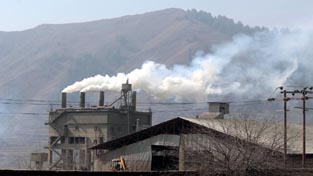Suhail Bhat
Srinagar, Mar 8: Non-compliance by cement factories and lack of proper environmental audit has left the inhabitants of twin industrial hubs of Kashmir – Khrew and Khanmoh – in South Kashmir vulnerable to life threatening health problems.
These factories emit one lakh kilograms of toxic fumes per day thereby wrapping the neighbourhood villages in a toxic grey shroud. The air pollution is blamed for number of respiratory tract infections. In 2015, nearly, 20,000 people were reportedly diagnosed with several respiratory tract diseases and there are also ten tuberculoses patients in these twin industrial hubs.
These industrials areas have been turned into dust bowl. At present, approximately spread over on 1000 kanals of land, nine cement factories are operational in Khrew and Khanmoh and they are posing a clear danger to the survival of flora and fauna and human lives.
Medical Officer at Primary Health Centre Khanmoh, Dr Aijaz Ahamd said he was shocked to see the frequency of patients with respiratory tract ailments in these areas. “I have served at Chest and Disease Hospital Srinagar for ten years but was shocked to see the number of people with respiratory tract infections here”, he added.
Dr Aijaz said a large number of children here have Acute Allergy Bronchitis which is alarming. “Skin infections like Dermatitis, Eczema and rashes are more common here. People also suffer from Furunculosis and conjunctivitis,” he added.
Locals said that these factories are running with pollution controlling devices which are inefficient and inadequate to control pollution. “There are no in-situ monitoring devices installed in these factories so that the particulate matter doesn’t get into the atmosphere,” they said.
“The chimneys are spewing untreated air relentlessly and down the line 5 to 10 years these factories wouldn’t survive themselves if they won’t check it out right now,” said Adil, an activist, adding: “the cement factories are violating the Forest Act 1990 by operating under dense forest cover and flaunt the afforestration rules by not planting enough trees. They are shying away from their corporate social responsibility.”
He said these factories have to seek permission from the industries to extend their production but they are operating because of influence and power.
Environmentalists say one major pollutant contributing to these areas’ bad air is particulate matter, which includes concentrations of fine dust, soot and aerosol particles less than 10 microns in diameter (known as PM 10).
The level of such particulates is measured in micrograms per cubic meter of air. The world environmental experts stipulate that any reading above 40 micrograms is unsafe. But Jammu and Kashmir allows 100. In last six months, the average PM 10 level was 80, according to the pollution control.
Regional Director of Pollution Control board Kashmir, Mohammad Shafiq, said he will not rule out that there is no pollution “but it is not alarming, people are exaggerating”.
“Apart from regular industrial audits we have set up two monitory stations in these areas which are monitoring the ambient air very closely,” said Shafiq, adding that all the cement factories are fitted with pollution control devices like ASP’s and back filters but whether they are efficient or not is debatable.
“Everything will be sorted out once online monitoring system will be installed at these factories and we have already sent legal notices asking to fit in online monitoring devices. By the end of June or July everything will be clear,” Regional Director added.
There are nearly 200-300 unauthorised quarry units operating in Khrew and Khonmoh which are looting the resources illegally and supplying it to these factories. These quarry units once used to be home of wild life animals like dear, leapord and bear.
Farooq Ahmad, an official at Geology and Mining Department, said: “The factories have been given specific places to mine the raw material and we regularly visit the sites to check any irregularity. Last year we have seized large number of vehicles who were operating illegally.”
Trending Now
E-Paper


